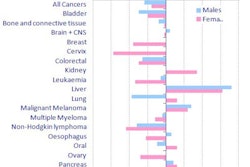The development of new chemotherapy agents, new combinations of agents, and changes in the relative timing of surgery, radiotherapy, and chemotherapy treatments may potentially bring about increases in both survival and quality of life for patients suffering from oral and oropharyngeal cancers, according to a new study in the Cochrane Database of Systematic Reviews (April 13, 2011).
Treatment of oral cavity cancer is generally surgery followed by radiotherapy, whereas oropharyngeal cancers, which are more likely to be advanced at the time of diagnosis, are managed with radiotherapy or chemoradiation, the study authors noted. Surgery for oral cancers can be disfiguring, and both surgery and radiotherapy have significant functional side effects, notably impaired ability to eat, drink, and talk.
So researchers from the University of Manchester set out to determine whether chemotherapy, in addition to radiotherapy and/or surgery for oral cavity and oropharyngeal cancer, results in improved survival, disease-free survival, progression-free survival, locoregional control, and reduced recurrence of disease. On December 10, 2010, they conducted a one-day electronic search of the Cochrane Oral Health Group Trials Register, Cochrane Central Register of Controlled Trials (Central), National Library of Medicine (PubMed-Medline), Excerpta Medica Database (Embase), and Allied and Complementary Medicine Database (AMED). Reference lists of recent reviews and included studies also were searched to identify further trials.
Randomized controlled trials in which more than 50% of participants had primary tumors in the oral cavity or oropharynx, and which compared the addition of chemotherapy with other treatments such as radiotherapy and/or surgery, or compared two or more chemotherapy regimens or modes of administration, were included in their review. A total of 89 trials met the inclusion criteria.
The researchers found evidence of a small increase in overall survival associated with induction chemotherapy compared with locoregional treatment alone (25 trials, p = 0.06). Postsurgery adjuvant chemotherapy is associated with improved overall survival compared with surgery ± radiotherapy alone (10 trials, p = 0.03), and there was some evidence that this improvement may be greater with concomitant adjuvant chemoradiotherapy (4 trials, p = 0.03). In patients with unresectable tumors, there is evidence that concomitant or alternating chemoradiotherapy is associated with improved survival compared with radiotherapy alone (26 trials, p < 0.00001).
"Chemotherapy, in addition to radiotherapy and surgery, is associated with improved overall survival in patients with oral cavity and oropharyngeal cancers," the study authors concluded. "Induction chemotherapy may prolong survival by 8% to 20%, and adjuvant concomitant chemoradiotherapy may prolong survival by up to 16%. In patients with unresectable tumors, concomitant or alternating chemoradiotherapy may prolong survival by 10% to 22%."
However, they found insufficient evidence of which agent or regimen is most effective, they noted.



















